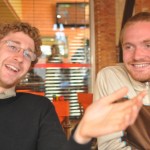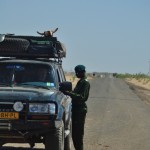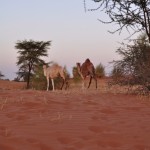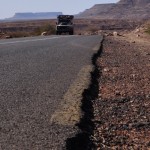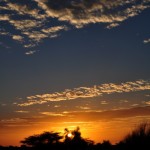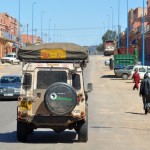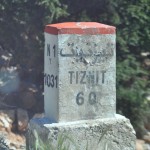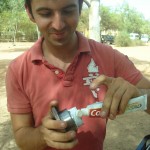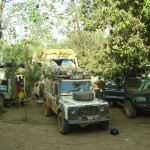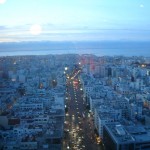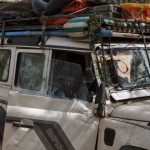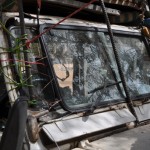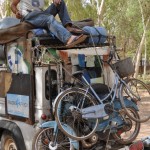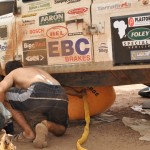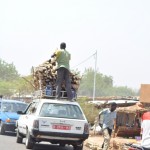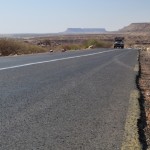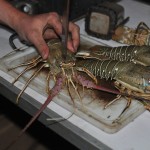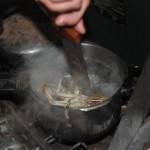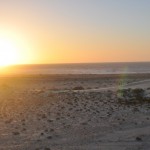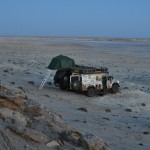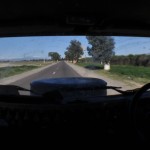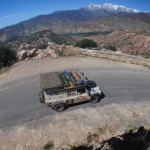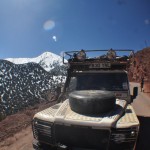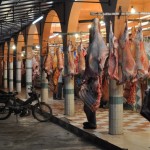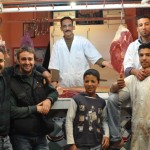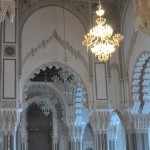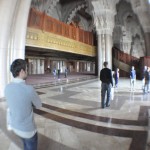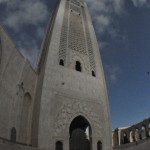Our time in Africa was short now; in a few months we would be back in Europe, back in the UK, back home. For now though, we were making the final turn North, heading into the interior and back into the desert.
We were in Burkina Faso, preparing to leave for Mali. However, before we left, we had time to extend our cultural horizons.
By happy coincidence, we had arrived in Ouagadougou in time for the start of FESPACO, the two week African film festival, held during alternative years in Morocco and Burkina Faso.
Ouaga is a calm and friendly city anyway, but during FESPACO the influx of tourists ensures that this atmosphere is enhanced. A wide variety of African films are shown around Ouaga at numerous venues, centred around the main screen in town.
The main screen is open air, allowing you to critique the newest African cinematic offerings whilst sat under the brilliantly lit backdrop of an expansive African night sky.
The films all dealt with serious African themes and set characters against strong problematic backgrounds. However, there was always room for a smile. During a South African proffering centred around police corruption, one member of the audience broke into applause as the main protagonist was shot and killed!
This was the premiere African film festival and as such it was lovely to witness once again how Africans bond with each other and celebrate each others successes irrespective of origin. If you are African, you are part of a continental family and it was common for all the films to be followed by applause afterward and during the directors introduction.
This brotherly sense of unity was never more obvious than during the World Cup, when everyone was delighted that such a competition was being staged in their continent and would support other African teams above all others. The affection and hospitality (which we have so regularly been the beneficiaries of) with which Africans show to one another makes it all the more puzzling when this continent has such a bloody recent past and, sadly, present such as Ivory Coast.
Aside from FESPACO, our time in Ouga was characterised by zooming around this small, dusty city on a Motobecant moped hunting for visas and a rear axle drive flange, as ours had worn sufficiently to allow oil to keep leaking out. As we were now topping up the axle with 1 litre of EP90 every few hundred miles, we decided we weren’t going any further until it was fixed.
Luckily with the help of South African overlander Dave and the Dutch overlanding boys, Gert & Dion, we eventually found an unused but rusty replacement and, having taken the rust off with toothpaste (!), fitted it.
After trying out three Chinese seals, which all leaked whilst spinning the prop shaft by hand, the Nigerian parts man Johnson suddenly asked us if we wanted to try the seal for the 300tdi Defender instead. Despite clearly saying countless times which model our car was, somehow he had managed to give us the wrong seals until then. This seal went in and thankfully four thousand miles later, we’ve seen no oil leaking.
Dave & Natalie and Dion & Gert, left Ouaga before us to visit Dogon country in Mali, whereas we elected to leave a day later and drive directly to Bamako. Leaving Ouaga early on a Sunday morning we had no problems, despite the reports of rioting on the main road, however the scorched marks on the tarmac from the burning of tyres were there for all to see.
Rolling through the border in all of 15 minutes, we set off for the Malian capitol. Our campsite in Bamako became our home very quickly, as the other two couples arrived. All three cars disgorged their contents into the shared space between the trucks and within minutes we had a communal area complete with chairs, tables, hammocks, cookers and a case of cold Coke.
The camps inflatable pool provided welcome respite from the soon-to-be-Saharan-sun and the tree shade allowed us the opportunity to relax in some comfort, before we headed north into Mauritania and back into the sand seas.
Being near the American embassy (albeit several hundred metres away), we quickly heard of the bomb threat to the Embassy and staff that week. Of equal concern to the Americans (who phoned all Yankies in town that night) was that Col. Gadaffi was recruiting Tuareg mercenary fighters in Bamako, over the river from our camp at the Libya Hotel.
The Tuareg are a desert people; conspicuous by their royal blue headwraps, AK47s and love for camels. These people are hard. They live in the desert, surviving off of a barren land, prepared to fight at any moment for the little they have, herding their camels and families through the sand.
They are also prepared to take a reported $3000 to fly to Libya and a further $1000 a day to fight someone else’s war. However, the only Tuareg we saw in Bamako was on his camel, wandering around the forecourt at a petrol station in the centre of town. We were unable to ask whether or not the dromedary in question took diesel or petrol.
Despite Colonel Gadaffi’s wrongs, his removal will not be a swift and straight-forward process. This guy has made a point of investing in Governments and businesses all over the continent in the last 30 years, an obvious example to us being the huge Gadaffi mosques in many capital cities and his majority stake in Uganda Telecom. Sadly, there could be a negative impact on other African economies if he does go.
Whilst in Bamako, we took the last opportunity to visit a big market whilst still in ‘Black Africa’. We jumped into the first taxi, squabbled vigorously but good naturedly in French about the price, then sat back and watched the pedestrians scatter ahead of our charging 20 year old Mercedes.
The traffic, as with all African capitals, was fierce. As our man darted, swerved and sashayed his way through the traffic, we heard a strange noise. Over our left shoulders, someone had just shouted “Meow!” very loudly. Looking around, we saw a Malian chap and his friend astride one of the ubiquitous 125cc scooters. He saw our puzzled gaze and, smiling broadly, shouted “Ca c’est mon klaxon!” and sped off into traffic, ‘Meowing’ as he went. Nutters.
Further along, we saw one of the traffic-jam hawkers selling Moz-Bats, the electrified tennis bat shaped mosquito killers. We asked how much and were quoted a price of 3000CFA or so. Our driver at this point puffed his cheeks, turned to us to advise, “Non, 1000CFA maximum” and, as the traffic was clearing, began to move on.
Our street seller started to jog with us. Ok, he said, 2500. We, now privy to the local price, demanded less. The traffic now gone, we were picking up speed. Our man began to run, faster and faster, still haggling. He ran through a busy junction behind us and regained ground as we slowed for a roundabout. With the price now at 1800, we considered paying. Our man had by now flat our sprinted a kilometre or so, his merchandise banging about as he went.
Ok, 1000CFA final price, we insisted. He shook his head and looked offended at our meagre offering, as best one can whilst running at full pelt alongside a taxi on a dual carriageway. As he didn’t drop to 1000CFA, our driver dropped his foot and sped away, leaving our street hawker standing in traffic, out of breath but already looking for the next sale.
Naturally, the only thing now missing from our African taxi journey was a car accident. Sadly, we were not to be treated to the full experience as we simply had to settle for a hole in the taxi’s front wing after our driver impatiently pushed out at a stopped junction to be hit by a man struggling to slow down his pushcart-load of iron poles.
Before we could leave Bamako, we needed to speak to the Mauritanians about a visa. They were good natured and prompt, sorting the visa out in a day. The guards outside were also friendly. Chatting whilst waiting for the taxi, we asked one of them why he was armed with a pistol and an AK, whilst his companion had to do with just the sidearm.
He explained that ‘he had been trained’. He went further, clarifying that the pistol was to be used if they were attacked by one assailant, maybe two. The machine gun was for use on crowds. Such is Malian Army training.
We said goodbye to Dave and Natalie who were Senegal-bound, trying to keep their journey and car going despite facing paperwork and mechanical problems at every opportunity. We had the upmost respect for their attitude and were sad to see them go.
The route out of Bamako was hassle free and within two days we were crossing into Mauritania, in convoy with the Dutch guys in their Landcruiser. This small desert and scrub lowland protruding onto the West coast is home to only some 3,000,000 people. The vast North Eastern tracts of land stretch into the Sahara and imperceptibly merge with Northern Mali and Southern Algeria somewhere in the sands.
Mauritania has something of a bad rep when it comes to white tourists. At present, it is rated 1st in the Top Ten ‘Don’t Go There You’ll Definitely Be Bloody Kidnapped by Al Qaeda’ index, which can be found on the British FCO website as well as most other European governmental advice pages. Although it may be called something else, we’re not sure.
Of course, this threat is less immediate than the FCO might suggest. Certainly, if one goes off into the desert on ones own, making waves and shouting about where one might be going next, one might be in a position whereby one might be attacked.
However, the average Mauritanian is not a war-mongering nutcase. We’ve got more chance of being kidnapped by Angelina Jolie (please, please, please) than by the old Al-Q. Our first experience of Mauritanian peoples came at the border post, as we waited for our Dutch travelling companions to finish their Customs paperwork.
As we are constantly asked for gifts, presents and ‘small monies’ by the police, we have taken to beating them to the punch, demanding ‘cadeaux pour le blanc’ or gifts for the white.
This usually results in broad smiles all round and delicately sidesteps being asked for cadeaux ourselves. To explain, our use of ‘le blanc’ isn’t an attempt by us to introduce any kind of racial superiority; rather it is the standard phrase for white man across all of West Africa, just like farenji in Ethiopia, Obruni in Ghana and Muzungo in Swahili speaking Africa. Having knowledge of these phrases and not being bound by some Western fear of offence by not to using them immediately indicates to locals that you aren’t a fresh-off-the-plane tourist.
However, when we asked the Malian Customs man for a gift, he instead inquired what we would like. Naturally, we told him we wanted a camel. Each. “Ah, camel milk? Ok, no problem.” he said and soon returned with a bottle of freshly poured, slightly warm milk. Nice! We all tried some, and despite the inoffensive taste we couldn’t quite get over the distinct body temperature.
Speaking of temperature, our first night in Mauritania was bitterly cold and we all spent time reorganising clothes and sleeping gear from the bottom of our bags as we knew it would only get colder. Even woolly hats had layers of East African dust bashed off them such was the viciousness of the chill on us poor warm blooded Africans.
Despite the mixed reports we had heard, all Mauritanians so far had been particularly warm and friendly. Campsite owners and shop-keepers wanted to chat apparently forever and prices were quoted fairly.
With nice views, good roads and cheap diesel we don’t really have much to complain about. Apart from the Police. Whilst the Police were almost always friendly in our meetings with them, the meetings were all to frequent. On average we were waved down by Police every 30km throughout the couple of thousand miles we drove, each time having to hand them a copy of our prepared ‘Fisch’.
This document lists both of our details and the cars details, thus allowing us to simply hand the authorities a copy of the info they require, thus saving us having to write out everything for each policeman.
Naturally the police still asked for a cadeaux, but after a while we developed a ploy whereby we would simply explain that we did not have any presents, but the rich Dutch people in the Land Cruiser behind us had countless bounties for them. We would then take off at speed, later to be regaled with stories from the Dutch about how the police had given them a particularly hard time all day…
Unlike the desert lands of the east, the south west reaches out to quench its thirst at the Atlantic. As with the rest of Mauritania, the people and police were friendly and happy to see foreigners visiting. The coastal town of Nouakchott comes as a welcome break from the dry interior and boasts a brilliant beachside fish market.
Here, boats unload onto the beach and stalls are set up in the concrete hall to sell the seas daily bounty. A huge variety of fish and crustaceans ends up on the table, all at a price which sees you cart crateloads away, thinking only afterwards of what to actually do with all of it.
On the taxi ride home, the newly purchased live lobsters decided they didn’t like the interior of their plastic prison and promptly staged a breakout, cutting through the shopping bags and flipping about in the passenger footwell. The taxi driver carried on regardless, just another day.
Spending just one night in Nouakchott, as we continued further north, towards Western Sahara, the populace thinned out. Bush camping here amongst the lowrise dunes, we watched the last embers of the setting sun stain the sand blood red before dipping down to leave us wrapping up against another cold night.
Following the Dutch boys advice (they had already travelled this route on their way South 3 months prior) we tried to leave our next big fuel fill up until Western Sahara, as diesel there was the equivalent of 40p a litre. Thus, we ran light with minimum reserves.
Unfortunately our best laid plans went out the window as we battled a huge headwind and 5 hours later found ourselves sat at the side of the road clean out of diesel, having completed just 280 miles on a tank, compared to the 400 we have managed every day for the past year!
Still 40km from the nearest town, we were glad to have the Dutch boys with us as they immediately tore off down the road to find us fuel. Thanks lads! For the next week the headwind continued, a consistent Southerly wind as we went North. Our max speed dropped to 50mph for the next week and the fuel consumption immediately returned to normal.
As we have mentioned, the temperature change from central Mali to western Mauritania was drastic. The constant fresh wind banished thoughts of 42 degree days in Bamako and, whilst the sun still shone, our jackets and woolly hats were never far from reach.
The short drive to the border with Morocco’s southern most colonial tip of Western Sahara took decidedly less time than the 5 hour border crossing, as the Moroccans took their own sweet time to mess us about waiting for paperwork and X-raying the car.
The various customs officials did make us laugh though, by asking if we had any alcohol, as we weren’t sure if this was to declare it or meant for them as a present! We decided to say no and talk our way out later. We soon realised however that it was just present s they were after, but asking in an officious tone with a uniform was a nice little trick.
Finally, we were through and ploughing north along the only road, the sea our constant companion some 200 metre to our left. Bushcamping for the next few days we battled northwards, pushing our three ton aerodynamic enemy through the heavy headwind. All day, every day, the wind always seemed to come straight at us, no matter where the road went.
Our fuel economy suffered terribly from the constant wind but, mercifully, diesel is dirt cheap round these here parts so we filled up with all we could, 180 litres coming in at a cool £50. Eventually, we made it to the Atlas Mountains and turned inland to take the longer route through the snow on the peaks on our way to Marrakech. Here, we said so long to our Dutch friends Gert and Dion, as they continued onwards to Spain and then home.
In Marrakesh we joined the hoards of European tourists traipsing round the famous Medina. It was interesting to see how much harder the market sellers here bargained – they were clearly used to money laden tourists and didn’t flinch in waving us along when the price wasn’t to their liking, clearly comfortable knowing that more tourists would be along the following day.
In the evening the main square by the Medina walls becomes the main attraction as food stalls spring into life and all manner of entertainment and musical displays appear in different areas of the large concrete area. Amongst the huge variety of shows were children’s boxing, snake charmers, traditional musical bands, magicians and dancing monkeys.
From Marrakesh we took the lovely paege route to Casablanca in order to once again meet Christian, Carl’s brother. After eventually finding him at the airport we followed directions and our GPS to the campsite in the centre of the town, only to find it had shut three years earlier, moving 20km down the road.
After umpteen wrong turns and dodgy local directions we eventually found ourselves at a large, but fairly run-down place with the gates firmly locked and the guard dogs in full aggression mode. Unperturbed we parked up outside and camped by the gate as it was now 2am! This wasn’t quite the ‘please find a place with a hotel attached as I won’t be bringing a sleeping bag’, which Christian had asked for, but he was very understanding.
We gave Christian a brief introduction to Ghanaian gin sachets and toured the few tourist sights in Casa. Top of the list was the giant mosque. The third biggest mosque in the world, it cost $700million to build and sports an electronic opening roof which weighs 1100 tonnes.
After the mosque we heading into town and to the bar atop the Kensie tower (highest building in Casa) to take in a sunset view of the city. Unfortunately after an hour, the price of the drinks and Tom & Christian’s insistence on using the disabled toilet (which had glass walls, providing a panoramic view of the city) despite the security guard’s insistence, meant it was time to leave. After a quick stop in a shisha bar we were home, having managed to grab a lift in the back of a friendly chap’s truck.
The following evening, the Moroccan football team took on their bitter rivals and neighbours Algeria, in what was billed as one of the biggest sporting events of the year. This fell on the Sunday evening so we got ourselves down to a local restaurant, which consisted of 10 separate independent butchers.
After selecting the meat we wanted from the man we trusted, we sat down inside with our mint teas, whilst the restaurant prepared the meat. Unfortunately Morocco lost the match 1-0, not that the teams performance bothered the Moroccan sitting next to us who explained that ‘the referee was paid by the Algerians’. It was that simple.
Things were to get interesting on the way home, typically in our final taxi journey in Africa. Cruising along the dual carriageway at 100kmh in one of the many cream Mercedes saloon taxis we passed a group of three guys at the side of the road and simultaneously heard an almighty bang, as a large rock or projectile was thrown at the taxi.
The taxi driver pulled into the Presidential Palace driveway, where there was a small police post, and explained what had happened. The guards appeared unconcerned and, having telephoned the police, the taxi driver performed a u-turn, tearing back up the road towards men who were still in sight. We can only imagine that the police told him something along the lines of ‘yeah that’s great, go and get the guys and we’ll think about doing something’.
The driver tore up to the group, jumped out in unison with another passenger, shouting and screaming at these men. These men resisted the driver’s demands that he go with him to the police and started shouting back.
So dear reader, what would you do if you were in our dear driver’s position? Far from the top of the list I’m sure would be to run back to the car and grab out a knuckle-duster/screwdriver weapon and then take the other guy into a headlock with the screwdriver against his neck.
Slightly confused by the situation developing, Carl and Christian got out of the taxi, ready to run or defend ourselves depending on the actions of the friends of the supposed rock-thrower. Meanwhile, screwdriver digging into his neck, the rock-thrower began to struggle.
Suddenly he managed to free himself and stumbled backwards into the second lane, clearly flustered and trying to compose himself. As if in slow motion, we all saw lights appear in the second lane and, despite shouting out, saw a passing car drive straight into this guy at about 50 mph, sending him sprawling over the windscreen and dumping him onto the floor. All of us agreed afterwards that we instantly thought he was dead.
Being Africa, the other car didn’t even slow down and tore off into the night. A female passenger from the taxi began screaming (taxi carries 6 people) and like lightning the driver ran to his taxi, clearing fearing he had just been involved in killing the boy.
Seeing the taxi was about to speed off, Christian jumped back in, thinking Tom was still inside. Tom, meanwhile, knew only that Carl and Christian were outside, and didn’t want to end up speeding off into the night with a deranged taxi driver. So it was that, as the taxi began to speed off (and oblivious to Christians re-entry) Tom threw open the door and got out, just as Christian managed to get back in.
Landing in the dirt in a cloud of dust, it appeared to Carl that Tom had therefore been kicked out of a moving taxi. Using the best Queen’s English, Carl now explain that if they wished to, the group of three guys who had caused all the problems could now leave, immediately. Amazingly, despite not speaking any English the guys got the message and promptly left. As Tom brushed himself off, Christian appeared, jogging out of the night, having stopped the taxi further up the road.
Meantime, the rock-thrower had miraculously stood up, seemingly without major injury, though looking a bit dazed, and began to make his getaway, along with his friends.
We first regrouped, all dumfounded, and wandered back along the road to the Police post, who had originally told the driver to go and confront the rock thrower. We arrived to find them all lined up in the road, smiling away, having loved the entertainment they had just been watching. We fumed at them and the following 10 policemen who turned up for doing nothing to intervene, before eventually being allowed to leave at 3am. We were then up at 7am to get packed away and drop Christian at the airport, leaving us little time to take in everything we had seen and experienced over the past 12 hours.
Keen to put the manic events behind us, we headed North and stopped in Rabat to get online and organise our ferry to Spain.
Wandering through the old Medina market in Rabat we asked a large policeman where we could get a beret just like his, to go with Carl’s military shirt. After mistakenly stating in French that Carl was a fellow policeman back in England, the chap couldn’t have been more helpful, leaving his post to guide us forth in search of such headwear.
Howls of laughter and much hand slapping followed the sign language explanation that Tom wasn’t a policeman because he had a small brain. After hours of traipsing round the cobbled streets, we tired of haggling and, still beret-less, headed back to the campsite.
A couple of days later, we completed our last bit of haggling over the price of the ferry ticket and boarded the boat to Spain. So, almost a year to the day after we left home, we felt like we were leaving our new home, Africa, as we began the short trip across the Mediterranean.
After a few days of smooth paige driving through Spain, at a service station we got talking to a Dunlop trucking employee on his way back from the weekend’s MotoGP race in Jerez. Now complete with Official Dunlop Podium hats, we also began chatting to a Portuguese driver who explained that he had been in Africa for 10 years and proudly rolled up his arm to display a tattoo showing ‘ANGOLA’ and two guns beneath it. Strange tattoo to have, but then again we’re not ex-military…
To break up the hours of motorway driving, and provide some brief respite from the constant expenditure on diesel and paege’s, we stopped off at Le Mans to visit the famous race track and drive part of the 24hour circuit. First up we visited the museum and salivated over the recent race winning Bentley and fellow TDI brothers: record setting Audi of Tom Kristiansen and Alan Mcnish. Sadly, apart from the fuel systems and dashing good looks, all comparisons between us and them finish.
After the museum we drove the road section of the track, trying to take in the history of the section of road we were currently on, for here legends such as Henry Ford, Enzo Ferrari and Ettore Bugatti had previously raced with scarves, gloves and goggles flailing in the wind.
When we had finished drooling over these wonderful machines, we made straight for Calais. A day later we were back on UK soil and benefitting from amazing generosity from friends, as we made straight to the MOT centre to ensure the car was road legal. Master mechanic Ricky insisted on paying for our MOT and John from Autoscreens bent over backwards to get one of his boys to change our windscreen, which was sporting a sizable crack. To both of you, our deepest thanks, it made our return to the UK all the easier and even more enjoyable.
After the Friday night Homecoming, we sat down with a good cuppa and reflected on the last 371 days spent covering 30,000 miles through 38 countries.
We’re not arrogant about it, but we have crossed countries others thought would be impassable. We have tamed barren lands, crashing rivers, high mountains, arid deserts, deep rainforest, endless savannahs and moonscape boulder fields.
We have charmed, schmoosed, lied, tricked, teased, cadjoled and laughed our way through borders and checkpoints too numerous to mention. We have battled bureaucracy in its many myriad forms and come up trumps more times that we ever thought we would.
Then there’s the truck. We’ve rebuilt the bloody engine as well as the chassis. We’ve lumped this old girl over hard ground and kept her going. We replaced what we could before we left and replaced everything else as we went round. She has hardly ever let us down and we’ve rewarded this 3 ton enemy of aerodynamics with love, care and frequent oil changes. What woman could ask for more? To us, it’s a testament to the advice and help we have been given from family, friends and companies on all things mechanical and Land Rover, that has got it through, and leaving it now, at the end, running better than ever before.
It is, without doubt, the hardest thing we have ever done. It is also, unquestionably, the best thing we have ever done.
The Africa part may be behind us, but ToHelAndBack is not finished, as more fundraising awaits.
Home now, real life beckons. Africa, as it turns out, was a breeze. The next bit will be the hard part.
To all who have spoken to us, emailed us and helped us over the last year and a half, thank you.




